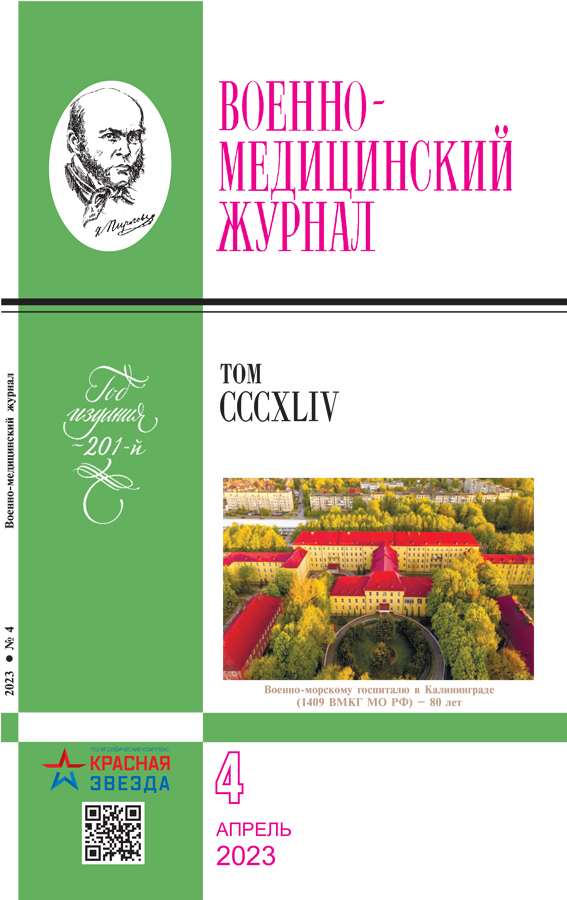Staged treatment of the Mirizzi syndrome Type 4, complicated by obstructive jaundice and acute cholangitis, in the COVID-19 pandemic
- 作者: Svyatnenko A.V.1,2, Demko A.E.1,2, Osipov A.V.1,2, Surov D.A.1,2, Kokorin V.V.3
-
隶属关系:
- The I.I.Dzhanelidze Research Institute of Emergency Medicine of the Ministry of Health of the Russian Federation
- The S.M.Kirov Military Medical Academy of the Ministry of Defense of the Russian Federation
- The P.V.Mandryka Central Military Clinical Hospital of the Ministry of Defense of the Russian Federation
- 期: 卷 344, 编号 4 (2023)
- 页面: 30-34
- 栏目: Treatment and prophylactic issues
- URL: https://journals.eco-vector.com/0026-9050/article/view/630201
- DOI: https://doi.org/10.52424/00269050_2023_344_4_30
- ID: 630201
如何引用文章
详细
With the timely diagnosis of the Mirizzi syndrome, approaches to treatment consist of the staged elimination of complications and appropriate surgical intervention. In a pandemic, there is a high risk of a patient becoming infected and being transferred to a hospital with an infectious profile, which can cause great difficulties in the treatment of unresolved complications of the underlying disease against the background of a viral infection and adversely affect the outcome. In a pandemic, biliary decompression in patients with Mirizzi syndrome and obstructive jaundice should be performed as soon as possible in a specialized center. This allows you to perform the second stage, aimed at eliminating the cause of the biliary block after rehabilitation of a viral disease. The optimization of emergency specialized surgical care should be based, first, on clear patient routing, the use of minimally invasive technologies, and the principles of staged treatment with the maximum use of all available resources.
作者简介
A. Svyatnenko
The I.I.Dzhanelidze Research Institute of Emergency Medicine of the Ministry of Health of the Russian Federation; The S.M.Kirov Military Medical Academy of the Ministry of Defense of the Russian Federation
编辑信件的主要联系方式.
Email: osipov@emergency.spb.ru
俄罗斯联邦, St. Petersburg; St. Petersburg
A. Demko
The I.I.Dzhanelidze Research Institute of Emergency Medicine of the Ministry of Health of the Russian Federation; The S.M.Kirov Military Medical Academy of the Ministry of Defense of the Russian Federation
Email: osipov@emergency.spb.ru
заслуженный врач РФ, профессор, полковник медицинской службы запаса
俄罗斯联邦, St. Petersburg; St. PetersburgA. Osipov
The I.I.Dzhanelidze Research Institute of Emergency Medicine of the Ministry of Health of the Russian Federation; The S.M.Kirov Military Medical Academy of the Ministry of Defense of the Russian Federation
Email: osipov@emergency.spb.ru
доцент
俄罗斯联邦, St. Petersburg; St. PetersburgD. Surov
The I.I.Dzhanelidze Research Institute of Emergency Medicine of the Ministry of Health of the Russian Federation; The S.M.Kirov Military Medical Academy of the Ministry of Defense of the Russian Federation
Email: osipov@emergency.spb.ru
доктор медицинских наук, доцент, полковник медицинской службы
俄罗斯联邦, St. Petersburg; St. PetersburgV. Kokorin
The P.V.Mandryka Central Military Clinical Hospital of the Ministry of Defense of the Russian Federation
Email: osipov@emergency.spb.ru
кандидат медицинских наук, подполковник медицинской службы
俄罗斯联邦, Moscow参考
- Есипов А.В., Абушинов В.В., Алехнович А.В. Новые требования к внутреннему контролю качества и безопасности медицинской деятельности: пути и инструменты их реализации в многопрофильном стационаре (сообщение первое) // Госпит. медиц.: наука и практика. – 2021. – Т. 4, № 1. – С. 45–53.
- Есипов А.В., Абушинов В.В., Алехнович А.В. Новые требования к внутреннему контролю качества и безопасности медицинской деятельности: пути и инструменты их реализации в многопрофильном стационаре (сообщение второе) // Госпит. медиц.: наука и практика. – 2021. – Т. 4, № 2. – С. 64–71.
- Есипов А.В., Алехнович А.В., Абушинов В.В. Covid-19: первый опыт оказания медицинской помощи и возможные решения проблемных вопросов (обзор) // Госпит. медиц.: наука и практика. – 2020. – № 1. – С. 5–8.
- Пугаев А.В., Гараев Ю.А., Алекперов С.Ф. и др. Лечение синдрома Мириззи // Хирургия. Журн. им. Н.И.Пирогова. – 2019. – № 3 (1). – С. 42–47. doi.org/10.17116/hirurgia201903142
- Ahlawat S.K., Singhania R., Al-Kawas F.H. Mirizzi syndrome // Curr. Treat. Options Gastroenterol. – 2007. – Vol. 10, N 2. – P. 102–110. doi: 10.1007/s11938-007-0062-7. PMID: 17391625.
- Chen H., Siwo E.A., Khu M., Tian Y. Current trends in the management of Mirizzi Syndrome: A review of literature // Medicine (Baltimore). – 2018. – Vol. 97, N 4. – P. e9691. doi: 10.1097/MD.0000000000009691. PMID: 29369192; PMCID: PMC5794376.
- Clemente G., Tringali A., De Rose A.M. et al. Mirizzi Syndrome: Diagnosis and Management of a Challenging Biliary Disease // Can. J. Gastroenterol. Hepatol. – 2018. – Vol. 12. –P. 6962090. doi: 10.1155/2018/6962090. PMID: 30159303; PMCID: PMC6109484.
- Csendes A., Diaz J.C., Burdiles P. et al. Mirizzi syndrome and cholecystobiliary fistula: a unifying classification // Br. J. Surg. – 1989. – Vol. 76. –P. 1139–1143.
- Mirizzi P.L. Sindrome del conducto hepatico // J. Int. Chir. – 1948. – N 8. – P. 731.
- Valderrama-Treviсo A.I., Granados-Romero J.J., Espejel-Deloiza M. et al. Updates in Mirizzi syndrome // Hepatobiliary Surg. Nutr. – 2017. – Vol. 6, N 3. – P. 170–178. doi: 10.21037/hbsn.2016.11.01. PMID: 28653000; PMCID: PMC5474450.
补充文件






